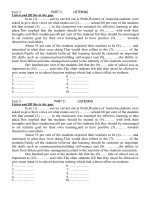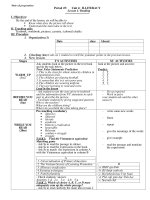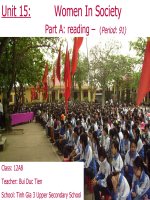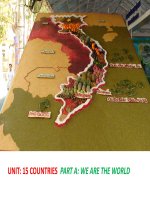Unit 15: Part A - Reading ( Thao giang - Co ban)
Bạn đang xem bản rút gọn của tài liệu. Xem và tải ngay bản đầy đủ của tài liệu tại đây (3.2 MB, 27 trang )
1
654
32
7
10
11
12
98
Taking care
of their
families,
and
doing the
housework
Working in
the offices
Part A: reading – (
Period: 91)
Class: 12B4
Teacher: Bui Duc Tien
School: Tinh Gia 3 Upper Secondary School
Unit 15: Women In Society
Throughout much of the history of human civilization, deep-seated
cultural beliefs allowed women only limited roles in society. Many people
believed that women’s natural roles were as mothers and wives. These
people considered women to be better suited for childbearing and
homemaking rather than for involvement in the public life of business or
politics. Widespread doubt about women’s intellectual ability led most
societies to deny education, employment and many legal and political rights
to women. It was men who controlled most positions of employment and
power in society.
The struggle for women’s rights the rights that establish the same −
social, economic, and political status for women as for men began in the −
18th century during a period known as the Age of Enlightenment. During
this period, political philosophers in Europe began to argue that all
individuals, male or female, were born with natural rights that made them
free and equal. These pioneer thinkers advocated that women should not be
discriminated against on the basis of their sex.
Today, although their status varies in different countries, women in
most parts of the world have gained significant legal rights. The most
important of these are: the right to have equal work opportunities and pay to
men, the right to vote, and the right to formal education.
Human civilization (n)
Eg: Human civilization has taken thousands of years
Homemaking (n)
Eg: Women are always busy with the homemaking
The age of
enlightenment (n)
Eg: The 18
th
century
is known as the
age
of enlightenment
Childbearing (n)
Eg:
She is at the age of
childbearing.
Political philosopher (n)
Eg: He works as a
Political philosopher.
Equal work opportunity (n)
Eg: Women and men have an equal work opportunity
Intellectual
ability (n)
Eg: Women’s intellectual ability is similar to men’s.
-
Involvement
(n) means the act of taking part in
something.
Eg:
He spoke openly about his involvement with
the singer
( VÝ dô: ¤ng ta nãi mét c¸ch c«ng khai vÒ sù tham gia cña
m×nh víi ca sü )
**************************************************
Let’s do the tasks!
1. Human civilization
2. Homemaking (n)
3. The age of
enlightenment (n)
4. Childbearing (n)
5. Political philosopher
6. Equal work
opportunity
7. Intellectual ability (n)
a. Triết gia chính trị
b. Sự sinh đẻ
d. Thời đại khai sáng
g. cơ hội việc làm công
bằng
h. Khả năng trí tuệ
i. Việc nhà
c. Nền văn minh loài
ng ời
8. Involvemnt (n)
e. Sự dính líu, tham
gia.
9. Deep-seated cultural
beliefs (n)
f. Niềm tin ăn sâu vào
tiềm thức
50:50
A. Working in
education
B. Building houses
1. According to the text , what was the main
role traditionally accorded to women?
C. Taking care of the
house and family
D. Working in
factories
Throughout much of the history of human
Throughout much of the history of human
civilization, deep-seated cultural beliefs allowed
civilization, deep-seated cultural beliefs allowed
women only limited roles in society.
women only limited roles in society.
Many
Many
people believed that women’s natural roles were
people believed that women’s natural roles were
as mothers and wives. These people considered
as mothers and wives. These people considered
women to be better suited for childbearing and
women to be better suited for childbearing and
homemaking rather than for involvement in the
homemaking rather than for involvement in the
public life of business or politics.
public life of business or politics.
50:50
A. Respectful
B. Supportive
2. Before the 18
th
century what was the attitude of societies towards women’s intellectual ability?
c. Resentful
D. Disbelieving
Widespread doubt about women…s intellectual
Widespread doubt about women…s intellectual
ability let most societies to deny education,
ability let most societies to deny education,
employment and many legal and political rights
employment and many legal and political rights
to women.
to women.
It was men who controlled most
It was men who controlled most
positions of employment and power in society
positions of employment and power in society
.
.
50:50
A. To free women
from housework
B. To establish a friendly
relationship between men and
women
3. According to the text , what is the purpose of
the struggle for women’s right?
C. To bring equality
between men and women
D. To argue that women have
better intellectual ability
The struggle for women…s rights …
The struggle for women…s rights …
the rights
the rights
that establish the same social, economic, and
that establish the same social, economic, and
political status for women as for men
political status for women as for men
…
…
began in
began in
the 18th century during a period known as the
the 18th century during a period known as the
Age of Enlightenment.
Age of Enlightenment.
50:50
A. 18
th
century
European people
4. What do “ these pioneer thinkers” at the end
of paragraph 2 refer to?
B. 18th century European
political philosophers
B. 18th century
European women
D. 18th century European
politicians
–
–
began in the 18th century during a period
began in the 18th century during a period
known as the Age of Enlightenment.
known as the Age of Enlightenment.
this During
this During
period, political philosophers in Europe
period, political philosophers in Europe
began to
began to
argue that all individuals, male and female, were
argue that all individuals, male and female, were
born with natural rights that made them free and
born with natural rights that made them free and
equal.
equal.
These pioneer thinkers
These pioneer thinkers
advocated that
advocated that
women should not be discriminated against on the
women should not be discriminated against on the
basis of their sex.
basis of their sex.
50:50
A. The right to hold
property
B. The right to equal pay
5. Which of following is not mentioned in t
he last paragraph as one of women’s legal r
ights today?
B. Equal
employment
opportunity rights
D. The right to vote
Today, although their status varies in different
Today, although their status varies in different
countries, women in most parts of the world
countries, women in most parts of the world
have gained significant legal rights. The most
have gained significant legal rights. The most
important of these are
important of these are
:
:
the right to
the right to
have equal work opportunities and pay to men,
have equal work opportunities and pay to men,
the right to vote, and the right to formal
the right to vote, and the right to formal
education.
education.
50:50
A. women’ s
intellectual ability
B. The age of
enlightenment
6. Choose the best title for the
passage
C. Women’ s rights
D. Women’ s roles
in education
Here are the summary sentences for the reading passage.
Match each sentence with one paragraph.
3. In the past, women were restricted to the
roles of mothers and wives due to
widespread doubt about their intellectual
ability.
1. The struggle for women…s rights began
in the 18
th
century as European political
philosophers believed that women should
be treated equally.
2. Women now enjoy important legal rights
such as equal work opportunities and equal
pay, the right to vote and to gain education.
Paragraph A
Paragraph B
Paragraph C
3. In the past, women were restricted to
the roles of mothers and wives due to
widespread doubt about their intellectual
ability.
2. Women now enjoy important legal rights
such as equal work opportunities and equal
pay, the right to vote and to gain education.
1. The struggle for women…s rights began
in the 18
th
century as European political
philosophers believed that women should
be treated equally.
Throughout much of the history of human
Throughout much of the history of human
civilization, deep-seated cultural beliefs
civilization, deep-seated cultural beliefs
allowed women only limited roles in society.
allowed women only limited roles in society.
Many people believed that women’s natural rol
Many people believed that women’s natural rol
es were as mothers and wives. These people co
es were as mothers and wives. These people co
nsidered women to be better suited for childb
nsidered women to be better suited for childb
earing and homemaking rather than for involve
earing and homemaking rather than for involve
ment in the public life of business or politi
ment in the public life of business or politi
cs.
cs.
Widespread doubt about women’s
Widespread doubt about women’s
intellectual ability let most societies to deny
intellectual ability let most societies to deny
education, employment and many legal and
education, employment and many legal and
political rights to women.
political rights to women.
It was men who controlled most positions of
It was men who controlled most positions of
employment and power in society
employment and power in society
.
.









